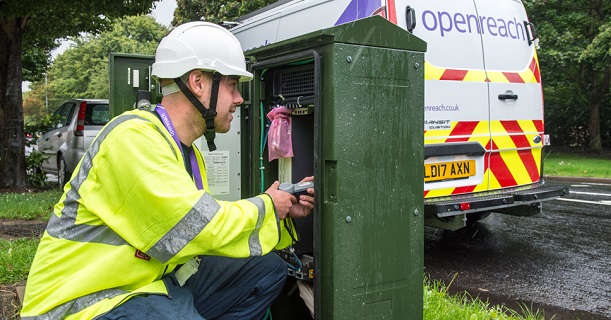BT Group’s new CEO, Philip Jansen, visited the UK’s new Prime Minister, Boris Johnson, seeking reassurance about returns on the investment needed to meet the doubled fibre roll-out targets.
Since coming to power in July, the Prime Minister said he wants the UK’s 32 million or so premises to have full-fibre, gigabit access by 2025, which is more than double BT’s planned deployment.
The former incumbent, BT, had a painfully slow start (the UK is at the bottom of the FTTH Council’s fibre penetration ranking published in March) to deploying full-fibre.
It only recently abandoned its distinct preference for faster broadband by taking fibre to the cabinet (FTTC, which, confusingly it marketed as fibre), then using its old copper-based infrastructure into homes. This reluctant change of heart was due to considerable political, regulatory and commercial pressure – strong fibre infrastructure is key to national 5G deployment.
Upped its game
Now BT has upped its fibre game, is passing about 20 million premises per month, and has committed to passing 4 million homes with full fibre and a rather woolly overall target of 15 million sometime in the middle 2020s.
While Jansen declared unstinting support for the new’s fibre plan, BT has stated it would take than £30 billion extra investment an additional, 30,000-strong workforce to hit the Prime Minister’s targets.
Jansen is following in his predecessor’s footsteps in insisting for BT to commit to ambitious targets, it must have reassurances from the government and regulator, Ofcom, that it will be able to recoup its investment.
This is couched in terms of a ‘fair bet’ and demands more helpful planning laws and greater subsidies to get infrastructure out to less densely populate areas.
Rivals fear unfair advantage
Sharon White, the outgoing head of Ofcom, preferred the approach of encouraging competition, such as from Virgin Media, Vodafone and alternative, fibre-only network providers like CityFibre (owned by the world’s biggest investor in infrastructure, Goldman Sachs) and Hyperoptic.
Competitors are fearful that such reassurance would give BT an advantage – Michael Sherman, BT’s Head of Strategy, didn’t hold back at the FTTH Council conference in Amsterdam in March this year, predicting that CityFibre and its like would be bankrupt within two years, or three at the most.
Sherman was sharing the stage in a debate with Gary Mesch, CEO of CityFibre and Hyperoptic, plus Mike McTighe, Chairman of BT’s access division, Openreach.
Despite considerable pressure, White also decided against forcing BT to spin Openreach off into a separate business, instead settling for it to continue operating within the Group but as a separate legal entity, with its own workforce.
BT reported earnings down by 5% for its last quarter, which ended in June, before interest, tax, depreciation and amortisation have been deducted.
Not such a shiny star?
Until now, Consumer had been the star of BT Group’s show, but commentators said that the Group’s earning suggested that that twice the number of fixed-line customers deserted in the second quarter than in the previous quarter, while average revenue per mobile user fell by 5%.
Further, last week BT admitted that given the approach to 5G taken by its rivals, it might well have to rethink its policy of premium pricing for 5G.
Vodafone, which launched its services at the beginning of July, launched unlimited data plans that do not charge extra for 5G, but take a tiered pricing approach, depending on speed.
The UK’s smallest mobile network operator, Three UK, has gone further, saying its 5G will be on an unlimited basis at no premium to 4G, and no speed-based, tiered pricing.
BT has said that it may not be able to continue charging a premium for its 5G tariffs after the launches of its rivals’ 5G services.
The head of BT’s Consumer unit, Marc Allera commented, “With all the investment in 5G and the fact it’s a faster, better network, we thought it would be logical to have a small premium for 5G. Others have not seen that logic.”
Allera also noted competition was increasingly fierce, and underlined the importance to BT of attracting customers to the company’s converged fixed-mobile offer, BT Plus.



